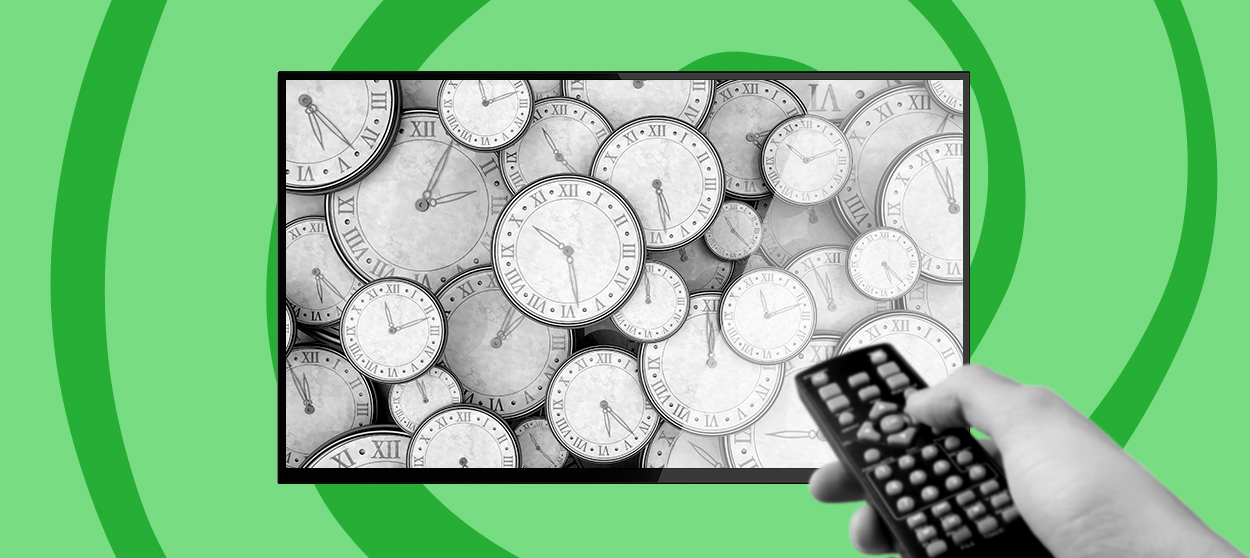The tantalizing time-suck of the reality TV marathon
What is it about these shows that our brains love so much?


A free daily email with the biggest news stories of the day – and the best features from TheWeek.com
You are now subscribed
Your newsletter sign-up was successful
Ever since NBC's marketing department coined the term "must-see TV" back in the 1990s, television producers and networks have continued to pitch the pubic on the idea that watching sitcoms and dramas should be a special event. We're meant to wait all week to watch the latest episodes, and then we're supposed to gather around the water cooler — in the virtual space, these days — to discuss what we saw.
That's one way to enjoy TV, absolutely. But what about when we're stuck on a three-hour flight, with a seat-back monitor looming in front of our faces? How about when we're chopping up vegetables in the kitchen, and need some chatter in the background to keep us company? Or when we're alone in a hotel room on a business trip, and want to zone out in front of the tube until we fall asleep?
It's times like these when we seem most inclined to tune into couples hunting for houses, or kids battling in baking competitions, or some schmuck traveling around the country attempting extreme eating challenges. This is when we need the kind of reality TV programs that air pretty much all day long on basic cable.
The Week
Escape your echo chamber. Get the facts behind the news, plus analysis from multiple perspectives.

Sign up for The Week's Free Newsletters
From our morning news briefing to a weekly Good News Newsletter, get the best of The Week delivered directly to your inbox.
From our morning news briefing to a weekly Good News Newsletter, get the best of The Week delivered directly to your inbox.
This holiday weekend, cable TV is going to be full of reality marathons. The Cooking Channel planned on running Man v. Food for 10 straight hours on July 4th. HGTV slotted seven hours of Lakefront Bargain Hunt. Discovery Channel is about Naked and Afraid, from early morning until after midnight.
This is pretty much the basic cable model now, all day every day — and has been for the past several years. Somebody somewhere has crunched the numbers and has run our psychological profiles, and has figured out that, under the right circumstances, we really don't mind spending an entire afternoon watching the same thing, over and over.
What crude pleasure-center in our brains do these reality TV marathons stroke?
A lot of credit is due to the ruthlessly efficient assembly of the shows themselves, which produce pleasing rhythms that lull viewers — and are distinct from the experience of binging sitcoms and dramas. Don't get me wrong: It's fun to watch four consecutive hours of Friends or Law & Order on cable, too. But fiction series thrive on twists, and as such, are very different from heavily stage-managed competitions and voyeuristic travelogues, which follow rigid, unchanging templates from episode to episode.
A free daily email with the biggest news stories of the day – and the best features from TheWeek.com
Take Man v. Food. Originally hosted by Adam Richman and now hosted by Casey Webb, the show's been largely unvarying from its first episode back in December of 2008 to its 124th, which aired on July 2nd of 2019. The host arrives in a new city and begins to tout the eating challenge he's going to take on. (World's hottest curry! Twelve-egg omelette! Four-pound grilled cheese sandwich!) He spends the first two segments eating more normal meals around town, and then the big challenge spans the episode's last two segments. Sometimes the host (or Casey) succeeds; sometimes he fails. No matter the outcome, right before the last commercial break, the editing and narration will imply he's "hit a wall" and may not be able to "push through."
Mini-cliffhangers abound in these reality shows, regardless of their sub-genre. The survivalists of Alone or Naked and Afraid will suffer their biggest setbacks right before a commercial. The antique-hunters on Storage Wars and Gordon Ramsay on Kitchen Nightmares will be shocked by something they've just seen … which the rest of us will find out about, after the break.
But the suspense here is actually pretty minimal. If the Property Brothers are having trouble with a home renovation, or if hospitality industry expert Anthony Melchiorri is about to give up on saving someone's business on Hotel Impossible, more often than not, they'll all straighten everything out in the final 10 minutes. Even if they don't, the mere fact that the moment of crisis tends to hit at the same point in every episode should be a cue to savvy viewers that some of these troubles have been exaggerated for dramatic effect.
In theory, this unrelenting, unapologetic predictability should be a drag on these series' popularity. And perhaps it does keep them from being "must-see TV" in the way that, say, Westworld is. I can't imagine many people consider Tiny House Hunters appointment television. Hardly anyone plans to watch Diners, Drive-Ins and Dives. We watch these series because they happen to be on, right when we're looking for something non-taxing.
But this is also why the strict tempos and patterns of a basic cable reality shows are such a selling point. Consider how many people unwind by doing jigsaw puzzles, or by filling in adult coloring books, or by working on a cross-stitch project. There's satisfaction — not surprise — in the simple act of connecting dots.
Why do it six times in a row? Blame inertia. If you're watching TV passively, you're not looking for reasons to change the channel. The frequent pre-commercial teases are pretty effective, too. Even culinary travelogue shows like Food Paradise and Bizarre Foods: Delicious Destinations lead into their breaks with tantalizing footage of some mouth-watering or unusual dish. Plus, these days — on cable especially — there's no pause between episodes in a marathon. Sometimes the next one begins playing in split-screen while the previous one's credits are still rolling. Before you have a chance to process what you've just seen, you're already hooked on what's coming next.
Insidious? Maybe. But benignly so. There are some harmful effects to watching four or five hours of a single reality show — if only because so many of these programs bend the truth and stack the deck in order to conform to the audience's expectations, which can skew our perceptions of actual reality. House-hunting series, for example, create misperceptions (and foster insecurities) about how much money the average American has to spend on real estate.
But whether it's cooking, surviving, driving across an ice road, or catching fish on the high seas, the big draw of a lot of these series is the opportunity to see people accomplish amazing things. That's why each episode's intro — and each pre-commercial tease — promises that if we stay tuned, we'll be awed and delighted.
And that's also why, if we stick around all day, these marathons become like friendly companions, steadily offering this affirmation: "Look at what your fellow humans can do." Sometimes that's all we need to keep us going until we've finished peeling carrots or until our airplane lands.
Noel Murray is a freelance writer, living in Arkansas with his wife and two kids. He was one of the co-founders of the late, lamented movie/culture website The Dissolve, and his articles about film, TV, music, and comics currently appear regularly in The A.V. Club, Rolling Stone, Vulture, The Los Angeles Times, and The New York Times.
-
 The ‘ravenous’ demand for Cornish minerals
The ‘ravenous’ demand for Cornish mineralsUnder the Radar Growing need for critical minerals to power tech has intensified ‘appetite’ for lithium, which could be a ‘huge boon’ for local economy
-
 Why are election experts taking Trump’s midterm threats seriously?
Why are election experts taking Trump’s midterm threats seriously?IN THE SPOTLIGHT As the president muses about polling place deployments and a centralized electoral system aimed at one-party control, lawmakers are taking this administration at its word
-
 ‘Restaurateurs have become millionaires’
‘Restaurateurs have become millionaires’Instant Opinion Opinion, comment and editorials of the day
-
 Walter Isaacson's 'Elon Musk' can 'scarcely contain its subject'
Walter Isaacson's 'Elon Musk' can 'scarcely contain its subject'The latest biography on the elusive tech mogul is causing a stir among critics
-
 Welcome to the new TheWeek.com!
Welcome to the new TheWeek.com!The Explainer Please allow us to reintroduce ourselves
-
 The Oscars finale was a heartless disaster
The Oscars finale was a heartless disasterThe Explainer A calculated attempt at emotional manipulation goes very wrong
-
 Most awkward awards show ever?
Most awkward awards show ever?The Explainer The best, worst, and most shocking moments from a chaotic Golden Globes
-
 The possible silver lining to the Warner Bros. deal
The possible silver lining to the Warner Bros. dealThe Explainer Could what's terrible for theaters be good for creators?
-
 Jeffrey Wright is the new 'narrator voice'
Jeffrey Wright is the new 'narrator voice'The Explainer Move over, Sam Elliott and Morgan Freeman
-
 This week's literary events are the biggest award shows of 2020
This week's literary events are the biggest award shows of 2020feature So long, Oscar. Hello, Booker.
-
 What She Dies Tomorrow can teach us about our unshakable obsession with mortality
What She Dies Tomorrow can teach us about our unshakable obsession with mortalityThe Explainer This film isn't about the pandemic. But it can help viewers confront their fears about death.
